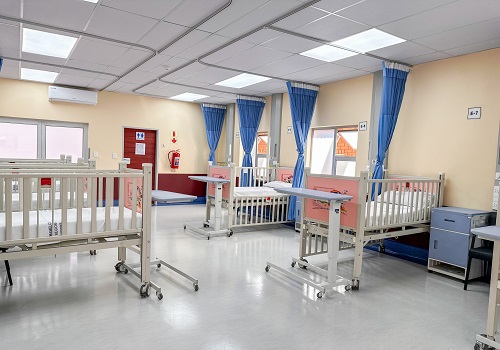Department of Health 2024/09/29 - 22:00

By Thuso Montwedi
The ongoing refurbishment and extension of health facilities in Gauteng, demonstrated by the upgrades at Mamelodi Regional Hospital and many other health facilities, highlights the crucial role infrastructure plays in preparing for the National Health Insurance (NHI).
While some critics have dismissed these developments as mere basics, arguing that infrastructure alone does not make a facility NHI-ready, it is important to understand the broader context. Infrastructure is not just about buildings and equipment; it serves as the foundation for delivering efficient, equitable, and high-quality healthcare services, a core aim of the NHI.
According to Dr. Adil Chikobvu, Director of National Health Insurance at the Gauteng Department of Health, "Good infrastructure is foundational to any health system that aims to provide equitable healthcare." This sentiment underlines that quality healthcare starts with having the right environment, facilities that are safe, functional, and equipped to meet patient needs.
Mamelodi Hospital, which was once considered to be facing significant challenges, has now become a leading example of NHI readiness in the province. With newly extended wards and refurbished units, including the Paediatric, Female Medical, and Surgical wards, the hospital has significantly increased its capacity. The additional beds are already reducing patient pressure, allowing for more efficient service delivery and better patient care outcomes.
The importance of infrastructure in healthcare cannot be exaggerated. As Dr. Chikobvu further explained, "Infrastructure serves as an enabler for the NHI's success. Without functional, well-maintained, and safe buildings, we cannot achieve the quality care that NHI envisions."
In essence, it is impossible to deliver on the promise of universal healthcare without ensuring that health facilities meet high standards of infrastructure, equipment, and safety. For this reason, the National Health Insurance Act ties the accreditation of healthcare facilities to the standards set by the Office of Health Standards Compliance (OHSC). This ensures that all NHI-participating hospitals, whether public or private, are held to the same quality benchmarks, which include structural soundness, reliable utilities, and the availability of essential medical equipment.
The transformation of Mamelodi Hospital is not just about bricks and mortar; it also signals the implementation of modern health technologies, such as the Health Information System (HIS), which allows for better patient record management and service efficiency. Dr. Chikobvu noted, "It's not just about having more beds or better buildings. Infrastructure improvements allow for the integration of new technologies and systems that are essential for a modern, efficient, and equitable healthcare system." This modernised infrastructure supports not only the day-to-day operations of the hospital but also the larger goal of achieving universal health coverage through the NHI.
While infrastructure is one of the key components of NHI readiness, it is important to recognise that the refurbishment of hospitals like Mamelodi is part of a holistic approach. For a facility to be considered fully NHI-ready, it must undergo a rigorous accreditation process, which evaluates its infrastructure, medical equipment, staff readiness, and safety standards. Mamelodi Hospital has successfully undergone this process, demonstrating its commitment to meeting the expectations of the NHI framework.
It's essential to have a clear understanding of what NHI aims to achieve and the legislative framework guiding it to understand this complex matter. The NHI, guided by both the NHI Act and the National Health Act, aims to build a healthcare system that is equitable and accessible for all South Africans, and quality infrastructure is a fundamental component of achieving that vision.
Mamelodi Hospital's transformation is a testimony to what can be achieved when investment in healthcare infrastructure is prioritised. The upgrades have not only improved patient care and increased capacity but have also boosted staff morale, as noted by Matron Portia Seekoi, who oversees the Paediatric Ward. The hospital's improvements serve as a model for other facilities in the province and across the country, showcasing how infrastructure can play an important role in preparing for NHI and delivering on the promise of universal healthcare.
RELATED NEWS
No related news
